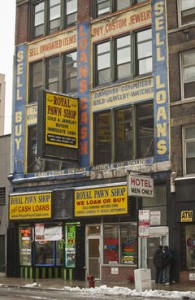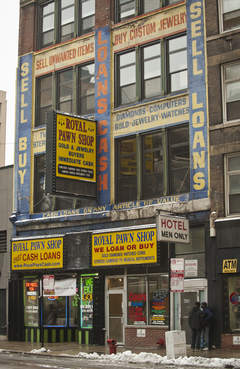BY MARK BROWN, Columnist

Ald. James Cappleman (46th) insists his determination to close the Wilson Men’s Hotel in Uptown, one of the city’s last two cubicle hotels, is based solely on his concern for the men who live there.
If he can just close the hotel, the alderman says, he can arrange for better housing for them than the substandard conditions in which they now live.
“My goal is to send a message that we as a city can’t allow our neighbors to live in cages,” Cappleman told me, referring to the wire ceilings that cover the rooms in cubicle hotels.
I dare Cappleman to try to sell that cock-and-bull story in a face-to-face meeting with the residents of the Wilson. He could start by explaining exactly where it is he’s going to move them.
“He’s not helping us. I don’t know who he is trying to help, but it’s not us,” said Jeffery Fiero, 60, one of the Wilson residents I met Wednesday afternoon.
“Where is he going to put these people?” said Duane Rajkowski, 64, who has been one of “these people” off and on at various cubicle hotels around the city since 1968. “To me, it’s a land grab. That’s all it is.”
“[The alderman] doesn’t understand the importance of a place like this,” said Jamar Washington, 33, who landed here when he lost his job and says he’s glad to have found it.
Let me note this was not some group of men arranged for my benefit by the hotel owner or by the Chicago Coalition for the Homeless, which has been organizing cubicle hotel residents to fight the closings.
This was me walking in cold off the street with no advance notice and talking with whomever I could find in the lobby.
I mention this because Cappleman is now accusing the coalition of “scaring” residents into believing they could wind up homeless — as if the ordinance he is co-sponsoring with Ald. Brendan Reilly (42nd) to close the Wilson and the Ewing Annex didn’t serve that purpose quite nicely all on its own.
The residents of a place like the Wilson, 1124 W. Wilson, don’t need anyone else to tell them that if you pull this lowly ladder out from under them, it’s a short but frightening drop to sleeping on the street or in a homeless shelter. They live with that reality every day.
Cappleman maintains that’s a false choice and that he can make sure all the men currently residing at the Wilson find better housing “if they are willing to have an assessment and work with their case manager” — no mention of what happens if that assessment reveals a criminal record, substance abuse problem, poor credit or lack of income.
“We have people and agencies waiting to help them,” said Cappleman, who says his personal background as a clinical social worker convinces him the hotel residents “don’t see the options that are available” because they lack coping skills.
Then maybe Cappleman should arrange for those “people and agencies” to begin by finding affordable housing for all the homeless people that the nearby Cornerstone Community Outreach must turn away every night from the 330 shelter beds it operates in the same neighborhood because they are filled to capacity.
And then the alderman and his team could go to work on finding housing for those 330 people staying in the shelters.
Then if there’s somebody in the hotel that Cappleman really wants to put into better housing, then he ought to step up and do it — and begin the long arduous process that social service providers in his area regularly face when they want to find low-income housing for a client.
I’m sure caseworkers could find better housing for some of the men staying at the Wilson, although they may still have their reasons for staying put.
But it’s an absolute fantasy to believe the alderman can wave his magic wand and turn their pumpkin into a carriage, although he might be able to make them disappear.
The real urgency, I suspect, is that a cubicle hotel for men living in poverty does not fit well into Cappleman’s stated top priority: to bring economic development to Uptown.
Before the recession, real estate in the neighborhood was starting to experience the same boom seen in Lake View. That’s poised to resume as the market recovers and will receive a boost from the CTA’s planned $230 million remodeling of the Uptown station, just a few doors down from the hotel.
I asked Cappleman if he’d worked to build any new single-room occupancy housing in his ward since taking office two years ago. The answer was no.

